- Home
- A P Bateman
Lies and Retribution (Alex King Book 2) Page 17
Lies and Retribution (Alex King Book 2) Read online
Page 17
“Yes.”
“That’s the most intelligent thing about it; not serving in warzones.”
“About five percent are deployed to a forward operating base. One person in about fifty may go into the field. Those briefing rooms get pretty combative over the coffee machine though,” Caroline grinned. “No, it was pretty hands-off. I left and applied for the Security Service. Transferred to General Intelligence Group soon after.” She sipped some coffee, studied his face for a moment. “You like action, don’t you? You feed off it.”
“I get bored staying still.”
“It’s more than that. You like it on the edge. I know your type.”
“You do?”
“I do.”
“Who?”
She put down her cup and folded her arms. “My partner, fiancé. Peter was in army intelligence but got frustrated at the procrastination. He got himself fit, went for SAS selection. He failed. Got fitter, tried again and went all the way. He was an officer so could only serve a four-year tour, but he loved it. Every minute of it.”
King nodded. He instantly respected the man for that. King had trained with the SAS as part of his MI6 recruitment. Start to finish. His fellow recruits were told he was in the Parachute Regiment. He had been given a legend to learn and only the Colonel knew he was an MI6 recruit. He was assigned to D-company and fellow paras on the selection course were sent into the other companies to avoid damage limitation to his cover. By the time most of the directing staff and recruits had worked it out, King was in the top tier of recruits and had been simply accepted as one of the men. The day the recruits were badged with their sand-coloured berets and winged dagger insignia, King was pulled out before the ceremony and sent on his first official MI6 mission. Over the years he had bumped into and rubbed shoulders with many of these same men, but he was not SAS. He was an outsider, a spook. But he had earned the respect of the best fighting unit in the world. He regularly went up to Hereford to hone his skills and keep abreast of new techniques or developments in equipment.
King watched her. Her folded arms had turned into a tight hug, and she rubbed her arms soothingly. King wondered whether Peter had often held her like that when she had been stressed or worried. The motion seemed to calm her. “How did he die?” he asked quietly.
She smiled. “Saving me,” she said. There was a moistness to her eyes, but she didn’t look as if she was about to cry. “We were tracking a suicide bomber, the result of a tip-off and subsequently detailed investigation. It was good intel and we had been on it for a while. There were two suspected bombers. One did what we thought, the other was a red-herring. Which meant that the terrorists knew we knew and had fed us a sacrificial lamb. When we stopped the first bomber, the second was nowhere near where they should have been. The second was at the site of the first, but was waiting until the whole circus showed up. Police, Special Branch, MI5, SOCO, the press, the public. Then the bomber strolls over and that was it.” She wiped an eye with the back of her hand, sniffed. “Peter showed up at the same moment as the bomber. He shielded me. The blast was terrible, so violent. It shook the world apart. My world, at least.” There were tears now, but still she did not cry. King knew how grief worked, he’d suffered his own. He stood up and walked to her. He put his arms around her and held her firmly. She resisted for a moment, and then he felt her go weak, almost drop into him. She was sobbing now. She pressed her face into his chest and cried. King could tell she had been automaton for a long time. She would have grieved at first, but her tough nature had pulled her through and she had not allowed herself to finish the process. They stood for a long time. He said nothing, just held her, his hands firm and still. She was first to break away, and he stood back to give her space. Her eyes were red. There was a roll of kitchen towel on a dispenser and King tore off a couple of squares and gave to her. She wiped her eyes and blew her nose. “Thank you,” she said quietly.
“No problem,” he said.
“You’ve experienced loss as well?” She wiped her eyes a final time and balled the paper towel.
King nodded. “My wife,” he said. “Ovarian cancer.”
“Want to cry it out?” She smiled. “It certainly seems to help.”
“No,” he said. “I don’t do that anymore. There’s nothing left in there.”
39
Zukovsky kept the shotgun aimed at them as Marvin and Professor Orlev moved them one by one out from the cells and into the long-wheeled base Mercedes van. Each prisoner had their arms tethered behind their backs with cable ties, their heads covered with a plain white pillowcase. They moved unsteadily on their feet, cramping from their confined conditions, debilitated by the pillowcase, they were reliant upon their captors to guide them where they were going.
Orlev had protested at helping. He was a scientist, not hired muscle. Zukovsky had persuaded the man with a casual wave of the sawn-off shotgun. Orlev reluctantly desisted. Rashid should have been doing this work, but he had not returned with Zukovsky and Marvin. Orlev had not asked why. He was regretting having taken Zukovsky’s money, regretting having left Russia.
Marvin was rough with the men, he beat them around the head and punched them in the ribs. He shouted aggressively. The prisoners were scared, they let out grunts and whimpers as they were pulled and pushed about. Orlev noticed that Marvin was more gentle, though highly inappropriate handling the female prisoners. Again, he said nothing. He did not want to create more problems for himself. He continued to hood and move the prisoners until all twelve were seated in the back of the Mercedes van. They sat cross-legged on the rubber matting that coated the load space of the vehicle. Nobody spoke. There was an air of terror, a feeling of fear and despair among them. They were all trained individuals and their minds were all working hard as they remembered their training and played the long game. A few had protested at first, but Zukovsky had aimed the sawn-off shotgun at them and Marvin had beaten them so violently, that they had to be carried into the van and lay still on their stomachs either unconscious or unable to move. Anybody who knows anything about firearms knows that at close range there is no arguing with a shotgun, let alone one that has had all but twelve inches of its double barrels removed to create a devastating spread pattern for its lead shot. They had shown the intelligence agents that they held all the cards and given them all a show of force. They were now all compliant.
Marvin slammed the door shut and walked over to Zukovsky. “I will contact you when I get there.”
“No, there is a change of plan,” Zukovsky said.
Marvin tensed. “Which is?”
“Sergei is arranging for three of his men to accompany the prisoners. They will go with you. He is tied up keeping a watch for the target. I thought we would have completed that element of the operation by now. I have called him to send some more help. I feel it will be advantageous for you to have help when you get to Lowestoft. I have instructed Alesha to return to help me with the next phase. Losing Khalil and Rashid has left us at a disadvantage. Sergei’s men will level the field once more.”
“Sergei is a gun for hire, General. His men are cheap criminals. Forgive me, but can we trust his men?” Marvin’s brow was starting to perspire. It was not from the effort in moving the prisoners.
“Sergei spent four years in gulag for me,” Zukovsky replied coldly. “He did not talk at his trial, and lost his family while he was in that hell on earth. Four years in the fierce heat of Siberian summers, eaten by mosquitos. Four years of frozen winters, waiting for men to die just to take their clothes, his fingers frostbitten, food and water frozen solid. Still he did not talk. I trust him implicitly. If he recommends men to me, I will trust them also.”
Marvin nodded. “But I am still to go with them, the prisoners?” he asked, a little too keenly.
Zukovsky studied him. He had seen Marvin’s fear and concern handling the uranium flasks in the forest. “You do not wish to stay?”
“I will perform whatever is expected of me,” Marvin said hesitan
tly. “Use me how you will.”
“I intend to,” Zukovsky said. “But I wish you to assume command of the hostage transfer. There is much to take care of, tracks to cover. I can trust you?”
Marvin visibly relaxed. He saluted the general. “Yes, comrade.”
“Comrade,” Zukovsky saluted in return. “It will not be long now.”
40
He had crawled through the undergrowth, through nettles and brambles, their stings smarting and the barbs tearing at his flesh. He felt no pain from them, the overriding agony of the stab wounds cancelling out all other pain and discomfort.
He had waited to die. Waited for the blood to empty from him and the coldness to wrap him tightly, or for the others to come back and finish what they had started. He thought of his family; his mother, his father, his two sisters. He was sure he would die, but as he waited for release from the pain and for the stillness of death to wash over him, he realised that it was not coming quick enough. He had time to think. Time to wait.
Time to survive.
Rashid had grabbed great handfuls of earth and rubbed it into the stab wounds, plugging the openings and staunching the flow of blood. He rolled over onto his stomach, wincing at the pain, as acute as if he had been stabbed a third time. He had crawled on all fours at first, gritting his teeth together in determination. He had managed to get to his feet and stagger. He pushed himself from tree to tree to put distance between himself and the clearing, put in time and space to separate himself from his enemies. He had fallen often, but got back up each time. He thought back to his training all those years ago, thought back to the agony of those escape and evasion trials, those excruciating route marches through the Brecon Beacons, cold, wet, exhausted. Fuelled only by the determination to succeed. The will to make SAS selection. He was a Pakistani, an immigrant to the United Kingdom when he was just ten years old. He was a Muslim. And he was one of the country’s most elite group of soldiers, an experienced SAS soldier on detachment to MI5 to aid in the fight against terrorism. And he was determined to get through this fight, like so many others he had and he would make it to safety and report what information he had.
He kept up the pace. He knew every ten steps he made created a hundred for his enemy. Every direction he took increased their search significantly. He was running low on strength, but not on resolve. He needed water, needed blood. He knew he had to get clear, but he also knew he had to get help. Without medical attention he would not last long.
41
Forester’s driver pulled up outside the Holiday Inn in Mayfair. The hotel was brightly illuminated, modern, yet somehow in keeping with the area. Forester thought its location would be appealing for short-term visits, weekend city breaks.
His driver agreed to wait, but Forester had been accompanied by a member of his diplomatic protection detail. It was a service Special Branch provided that he called upon from time to time. Tonight was one of those times. The man in question was an experienced police sergeant who served in diplomatic protection and carried a Glock model 19 compact 9mm pistol. He was a tough-looking rugby player in a well-tailored suit. He followed Forester at a discreet six feet. He remained to Forester’s right-hand side. This kept his weapon hand free and clear.
Forester surveyed the reception area. Some low sofas and coffee tables had a few business types working at laptops and on smartphones. Forester ignored them and headed for the bar. He searched, his eyes pausing on a man at a table in the corner. The man looked up from his smartphone and stood. He buttoned his suit jacket and walked over.
“Thank you for agreeing to meet with me at such short notice,” the man said amiably as he held out his hand, his accent thick and guttural. “I did not want to go through the embassy. This is a rather delicate matter.”
Forester shook the man’s hand. “Major Droznedov.”
“Uri, please.”
“Uri,” Forester said. “Please, call me Charles.”
Droznedov smiled. He waved a waitress over. “You will have a drink?”
Forester nodded. “A gin and tonic, please, ice and lemon.” He waved a hand to his bodyguard. “A coke for my companion.” The waitress nodded, looked expectantly at Droznedov.
“A Budweiser, please.”
“Not vodka?” Forester asked as the waitress walked away. He sat down at the table. His protection officer sat at the next table. He was near enough, his back to the wall and he surveyed the room. “Or is that stereotypical?”
“I hate the stuff,” Droznedov smiled. “Well, I was practically weaned on it, but I prefer whisky. But I want a clear head, so just a few beers will be all tonight.”
Forester smiled. The drinks arrived and Droznedov held up his beer. The waitress had brought a glass with the bottle, but the Russian ignored it. “Cheers!”
“Na zdorovje!” Forester returned.
Droznedov laughed. He drank half of his beer in a large gulp. Foam frothed on the lip of the bottle as he placed it down hard on the table. He looked at Forester. “So, what progress have you made in hunting Vladimir Zukovsky?”
Forester sipped his glass of gin and tonic. “We are following a few lines of enquiry,” he said, placing his glass carefully on the coaster. “We have CCTV footage of people linked to him, a few names have emerged. We have a good lead on another named in some CCTV photographs.”
“Like who?”
Forester smiled. “What do you have? What are you doing here?”
“Ah, quid-pro-quo, no?”
“Something like that.”
“I gave you information,” Droznedov said. “You would not know about Zukovsky’s intentions if it were not for me. I just want to know what you have found out.”
“Well, we like to play things close to our chest at MI5.”
“Too close to allow a little cooperation from Russia?”
“Well, we’re not too friendly at the moment, are we? There was that random bombing in Syria which made things rather difficult out there, and the radioactive poisoning of Alexander Litvinenko. We’re still after some answers on that one. And then there’s all the planes crossing into our airspace, almost daily. We’re an island twenty miles off the coast of France, you should know by now where we are. One day we’ll shoot a plane down. It may be sooner rather than later.”
The Russian smirked, held his hands up in mock surrender. “Okay, okay. But maybe I can let you know more now. Help you even.”
“I’m sure.”
Droznedov leaned forwards earnestly. “Look, Deputy Director Forester, Charles. Let me help you. Let me join your investigation, quietly. Unofficially, even. Let me be involved. I may be able to help. I have been hunting this warhead, I have to find it. My superiors do not know I am here. If we find it, I do not need to be credited. I shall merely return to Russia. I just wish for it to be recovered. If it is not, then the conclusion does not bear thinking about.”
42
57°N 6°E, The North Sea
The Lady Majestic was sailing under her own identity once more. The boards bearing her real name and port had been screwed back and the crew had brought up thirty lobster pots from the hold and stacked on her deck. Both the Union Jack and the black background and white cross of the St. Piran flag, the Cornish flag, flew resplendently from the wheelhouse. She was rolling in the heavy seas, the swells at the three-metre mark. The currents were strong here, the English Channel funnelled through and opened out into the North Sea. The current hit them head on and the tide was pulling from north to south with the tide dropping on the English side.
The conditions had been good in the Baltic Sea. They were now eight miles off the west coast of Denmark, halfway into the return journey. After the vessel had passed trouble free through the Oresund Channel between mainland Sweden and Denmark’s smaller island of Sjaelland, home to the capital Copenhagen, Max Clenton had managed to snatch a couple of hours’ sleep. Leaving the boat in the capable hand of his lead crewman who piloted her around the point of Skagen on Denmark’s larger is
land of Jylland. As they had entered the rough waters of the North Sea and the boat had been hit by the onslaught of three-metre waves, Clenton had awoke with a start and resumed control. He knew his senior crewman was more than capable, but he had thought about the old Russian and his not so much veiled as blatant threats and his insistence upon his cargo arriving on schedule. They were halfway and Clenton could almost smell the money.
***
“Cod and chips, please. Oh, and put a battered sausage on top.” Hodges perched himself on the window-sill of the fish and chip shop and picked up a copy of the Evening Standard. He was tired and the headline didn’t make much sense. He tossed the paper down and breathed in the heady aroma of oil and vinegar, frying fish and meat pies.
“Thought I’d find you here,” Watkins smiled at him. “Jesus, this place reeks!”
“Gorgeous, isn’t it?”
“Your arteries must flow like treacle.”
“They do that too, look,” he replied, pointing to a blackboard. “Treacle sponge, dipped in batter, deep fried and then rolled in sugar.”
“Oh, dear God!”
“What did you want? Obviously not chips.”
“Somebody almost ran over a man in the road on the outskirts of Epping Forest.”
“So? That’s a long way off our patch.”
“He’d been stabbed.”
“Spit it out Watkins, I’m too tired for a big reveal. I just want my fish supper.”
“Sorry boss. The man had multiple stab wounds, he was in a very bad way. He was rushed into A and E at Brentwood. They’ve put him into an induced coma and he’s going into surgery about now.”
“I thought I said spit it out Watkins?”
“Sorry, he’s the other man in the CCTV footage buying the date rape drug,” she paused. “The police were called, one of the officers recognised him, did a check and is convinced it’s him. The man has an officer guarding him now. He will call direct as soon as the man is out of surgery.”

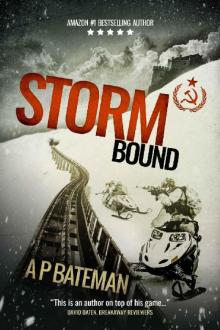 Stormbound
Stormbound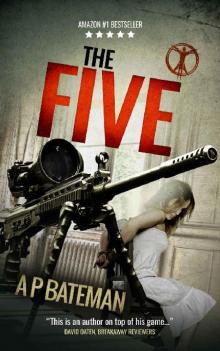 The Five
The Five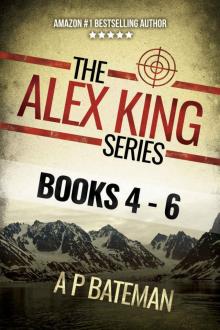 The Alex King Series
The Alex King Series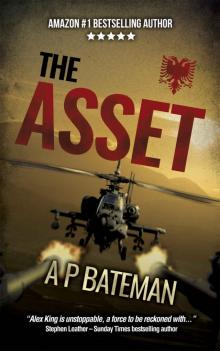 The Asset (Alex King Book 10)
The Asset (Alex King Book 10)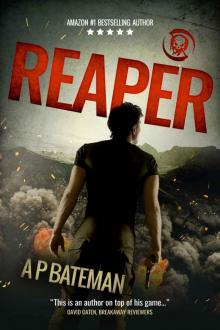 Reaper
Reaper Breakout
Breakout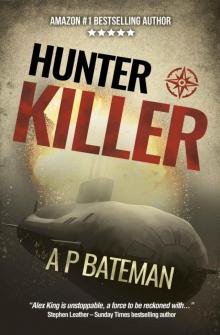 Hunter Killer - Alex King Series 12 (2021)
Hunter Killer - Alex King Series 12 (2021)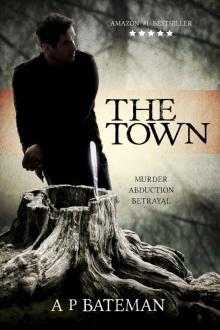 The Town (Rob Stone Book 2)
The Town (Rob Stone Book 2)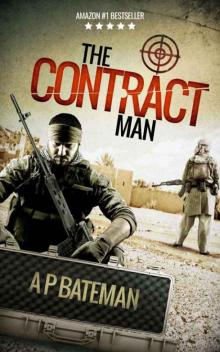 The Contract Man
The Contract Man The Island (Rob Stone Book 3)
The Island (Rob Stone Book 3)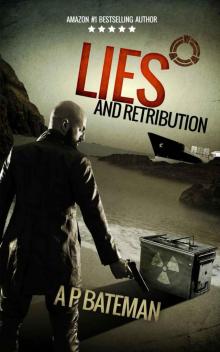 Lies and Retribution (Alex King Book 2)
Lies and Retribution (Alex King Book 2)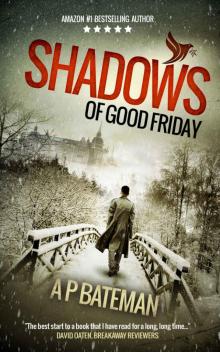 Shadows of Good Friday (Alex King Book 3)
Shadows of Good Friday (Alex King Book 3)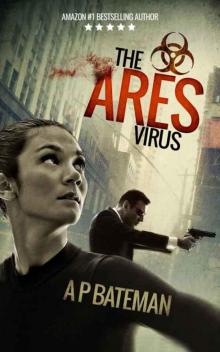 The Ares Virus
The Ares Virus